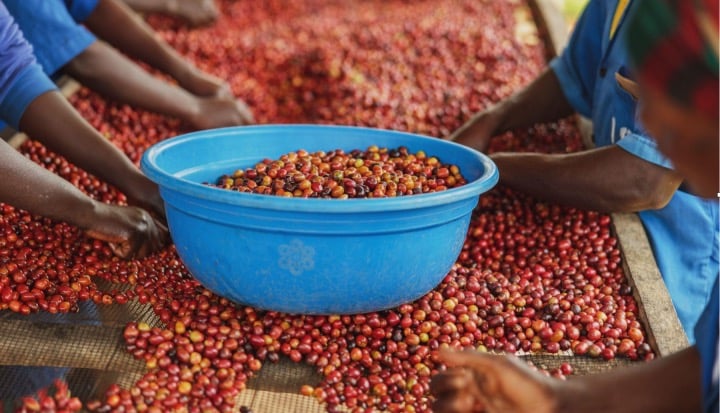Improving Human Wellbeing in the Coffee Supply chain: The Need for Better Data and Benchmarks
Ahh a freshly-brewed cup of coffee…if just the smell of it brings you comfort at the promise of a caffeine-hit each morning, you’re not alone. Globally, we consume over two billion cups of coffee every day. And yet, how often do we think about the 25 million smallholder farmers, predominately in developing countries, who rely on coffee production for their livelihoods? Is the farmer who produced our treasured morning cup thriving or barely surviving?
Despite widespread use of certifications (such as Fair Trade or Rainforest Alliance) the actual lives of these farmers—often lived in varying degrees of poverty—have traditionally been invisible to the consumer, coffee roaster or investor. The role of supporting or improving farmer livelihoods has historically fallen to NGOs, and the wellbeing of the farmer herself has been hidden within a complex agricultural system of value chain dynamics.
But the shifting tides of consumer expectations are driving change. Consumer purchase decisions are increasingly influenced by product sustainability and our collective understanding of supply-chain sustainability is shifting. Corporations operating in the coffee sector, from the roaster to the importer, are increasingly investing to improve the lives of farmers.
Do farmer support programmes work?
But are these farmer support programs actually improving the lives and livelihoods of farmers? Well, it’s hard to say. The effectiveness of individual programs is generally measured through customised, one-time studies, connected to the theory of change of the individual company. The siloed nature of impact measurement efforts makes it difficult to get a full picture of the system of support for farmers, and therefore to understand what farmers need and what support interventions work.
Just imagine that we attempted to measure company performance without standardised metrics. We’d never understand profitability without the shared metrics of gross margin, operating margin, and the like. But when it comes to social performance, this is precisely the situation we’ve found ourselves in; a lack of alignment on the metrics that represent social wellbeing, resulting in a lack of comparable benchmarks. This has increasingly become a constraint on our ability to address social issues and improve farmer wellbeing.
Benchmarks, benchmarks, benchmarks
Our goal at 60 Decibels is to produce scalable, comparable social impact data. We do this by listening directly to end-beneficiaries about the impact of various products, services, and programs designed to improve their wellbeing. To do this, we’ve established a network of over 1,000 researchers across 80 countries who conduct social research interviews by phone. They use standardised question modules, each designed for different sectors or social issues, to provide benchmarks of impact performance specific to the sector or geography.
Building a Farmer Thriving Index
In 2022, in response to the lack of comparable benchmarks for farmer wellbeing across agricultural supply chains, we started developing our Farmer Thriving Index. The index is designed to be simple, capturing four fundamental aspects of farmer welfare: living standards (based on consumption habits in the household); financial resilience (i.e. ability to cope with shocks); food security; and a farmers’ outlook for a particular crop (i.e. their own perspective on the sustainability of producing that crop, and whether they are likely to continue doing so). The tool looks beyond individual interventions and programmes to ask fundamental questions about how a farmer is doing, creating a new benchmark for value chain actors to improve the support they provide.
We initially tested the tool in the Ghanaian cocoa sector, gathering some fascinating data. Among other learnings, less than three in ten Ghanaian cocoa farmers had living standards that correlated to a living income, as many as 1 in 5 households cannot access clean drinking water, and about a third reported restricting food consumption by adults in order to allow small children to eat. Moreover, we learned that 44% of cocoa farmers didn’t earn a profit from their cocoa farms this year, challenging the sustainability of the cocoa supply chain.
Now, with the support of Small Foundation, we’re expanding the Farmer Thriving Index to coffee in East Africa. We are building a panel of coffee farmers in Uganda to establish a benchmark of coffee farmer wellbeing and inviting companies working in the coffee value chain in the region to join the index. We will implement the standard Farmer Thriving Index survey with farmers across the panel and participating companies later this year.
With increasing investment towards supporting farmers, we know we’re not alone in craving better data on what’s working and why so we can tailor this support effectively. We’ve consulted with a wide group of investors, industry bodies, corporates, academics and, of course, farmers to develop this index. Our hope is that forward-thinking companies will join this movement toward more transparency and shared learnings by taking part in the Farmer Thriving Index. By participating, companies can evaluate the wellbeing of their farmer suppliers in comparison to peer companies and a benchmark, enabling them to celebrate their success and target improvements based on data-driven insights. By listening to coffee farmers and establishing benchmarks of best practice, we can create a more equitable coffee sector that truly benefits the farmers and the whole industry.










